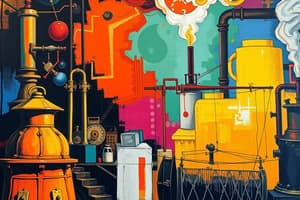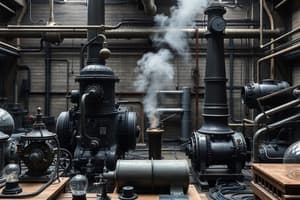Podcast
Questions and Answers
What was a significant impact of the printing press?
What was a significant impact of the printing press?
- Enabling the development of steam engines
- Promoting literacy through the rapid production of books (correct)
- Advancing medical technology
- Shaping the Roman Empire
In what way did the assembly line influence modern factories?
In what way did the assembly line influence modern factories?
- By decreasing the overall production speed
- By revolutionizing production processes and structuring them efficiently (correct)
- By introducing manual production processes
- By promoting hand-copied book production
Which invention is associated with the rapid dissemination of information and the rise of mass media?
Which invention is associated with the rapid dissemination of information and the rise of mass media?
- Telegraph machine
- Printing press (correct)
- Steam engine
- Assembly line
How did the printing press contribute to the Protestant Reformation?
How did the printing press contribute to the Protestant Reformation?
What is an evident impact of the steam engine on transportation?
What is an evident impact of the steam engine on transportation?
Study Notes
Pioneering Innovations: Steam Engine, Assembly Line, and Printing Press
In the realm of industrial inventions, three key discoveries transformed the way we produce, communicate, and disseminate knowledge, shaping the foundation of modern society. These inventions, the steam engine, assembly line, and printing press, opened new doors for productivity, standardization, and distribution. Let's delve into their origins and impact.
Steam Engine
The steam engine, first envisioned by Thomas Savery in the early 17th century, revolutionized energy production. James Watt's improvements in the 18th century, however, are most renowned. The steam engine allowed factories to harness power from a centralized location, leading to increased efficiency and speed. The steam engine's versatility in transportation, manufacturing, and production processes sparked the Industrial Revolution, transforming agriculture, textiles, and metallurgy.
Assembly Line
Introduced by American Henry Ford in the early 20th century, the assembly line was a game-changer in manufacturing. It greatly reduced production time and costs, allowing for mass-produced, high-quality goods at affordable prices. The assembly line's impact was twofold: it drove economies of scale and reduced waste, while also providing an excellent model for efficient production processes.
Printing Press
Joan Gutenberg's invention of the printing press in the 15th century was without doubt one of the most significant inventions in history. Before the printing press, books were hand-copied, making them expensive and rare. The printing press, however, enabled the rapid production of books, pamphlets, and other printed materials, democratizing knowledge and promoting literacy. The printing press also played a pivotal role in shaping the Protestant Reformation, further cementing its impact on society.
Influence and Legacy
These inventions have not only left indelible marks on history but continue to shape the world we live in today. The steam engine's influence on transportation and manufacturing is evident in trains, ships, and automobiles. The assembly line's impact can be seen in the way production processes are structured, as well as how modern factories operate. The printing press's legacy is apparent in the rapid dissemination of information, the rise of mass media, and the proliferation of digital content.
In conclusion, these three inventions—the steam engine, assembly line, and printing press—have transcended time, setting the stage for the industrial revolutions and technological advancements that followed. Their impact, while profound, is far from over, as they continue to influence the way we produce, communicate, and evolve as a society.
Studying That Suits You
Use AI to generate personalized quizzes and flashcards to suit your learning preferences.
Description
Test your knowledge on the transformative inventions that revolutionized energy production, manufacturing processes, and knowledge dissemination. Explore the origins, impact, and legacy of the steam engine, assembly line, and printing press in shaping modern society.




